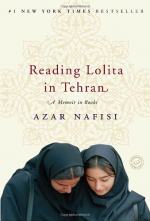
|
| Name: _________________________ | Period: ___________________ |
This test consists of 5 short answer questions, 10 short essay questions, and 1 (of 3) essay topics.
Short Answer Questions
1. What gift does Nafisi give to the magician?
2. Who is Mr. Bahir?
3. What does Nafisi describe in the epilogue?
4. Who is Mrs. Rezvan?
5. According to Zarrin, when is a novel moral?
Short Essay Questions
1. Why does Nafisi call Catherine in "Washington Square" the inverse of our ideas about what a heroine should be?
2. Why does Nafisi think teaching "The Great Gatsby" was the right choice for that time and place?
3. What does Nafisi do during her early years as a professor at the University of Tehran?
4. What does Nassrin mean when she talks about the "ordeal of freedom" in Part 4, Chapter 20?
5. How are the contemporary events in Iran similar to the events that Nafisi describes in her classroom?
6. Why does Nafisi focus on Azin's painted fingernails?
7. Nafisi first mentions the magician in Part 1, Chapter 10. Why does she wait until Part 2, Chapter 20, to describe him more fully?
8. What are the similarities between Sanaz's experience in jail and the experience of Cincinnatus in "Invitation to a Beheading"? What are the differences between their experiences?
9. How has Miss Ruhi changed since her introduction in Part 3, Chapter 14?
10. Part 2, Chapter 11 begins with a quote from Mike Gold, "Art is useful as bread." How is this quote related to the rest of the chapter and to previous incidents in Nafisi's text?
Essay Topics
Write an essay for ONE of the following topics:
Essay Topic 1
Nafisi presents several male students as passionate about the values of the Islamist Republic of Iran. In what ways are Mr. Bahri, Mr. Nyazi, and Mr. Ghomi similar? In what ways are they different? Which one of those students is portrayed as being in closest agreement with the regime? What evidence supports your choice?
Essay Topic 2
Throughout the memoir, Nafisi returns to the issue of wearing the veil. Write an essay that addresses Nafisi's feelings about the veil. What does the veil represent for Nafisi personally? What does it represent for her professionally? How is the veil used as a symbol in this book?
Essay Topic 3
In Part 3, Chapter 18, Nafisi describes a "perfectly equipped failure." In Part 3, Chapter 26, Nafisi provides characteristics of a traditional heroine. Using the descriptions and characteristics provided in these chapters, write an essay that addresses the following questions:
1) Would Laleh be considered a heroine or a perfectly equipped failure?
2) Would Razieh be considered a heroine or a perfectly equipped failure?
3) Which does Nafisi consider more worthy of admiration, a heroine or a perfectly equipped failure?
|
This section contains 1,459 words (approx. 5 pages at 300 words per page) |

|




